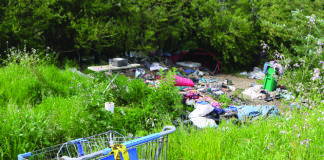
WATSONVILLE—When Watsonville voters head to the polls in November they will choose between two critical ballot measures concerning the future of the city.
Should they extend outward growth restrictions determined 20 years ago through 2040, or determine a new, 30-year growth plan for the city in a year-long community visioning process?
The Watsonville City Council in a split 4-3 vote placed a ballot measure that will run in opposition to the proposed renewal of Measure U spearheaded by a group of agriculture industry reps and environmentalists, better known as the Committee for Planned Growth and Farmland Protection.
That group’s initiative—placed on the ballot in March—seeks to extend Watsonville’s expiring urban limit line approved by voters in 2002 for another 18 years in order to preserve agricultural land.
The competing ballot measure introduced at Thursday’s special meeting would not toss out the restrictions included in Measure U—in fact, it would also extend them through 2040—but it could significantly change the urban limit line depending on the results of the upcoming general plan update, a massive, multi-month undertaking in which the community will determine what Watsonville should strive to be by 2050.
If approved, the measure would allow the council to amend the urban limit line to include parcels identified in the general plan update, which begins later this year.
Both the committee’s measure and the countermeasure only need a simple majority for approval. If both are approved, the measure with more votes in favor would win.
In addition, they both could fail. In that case, the committee and city would be back at the drawing board with some of Measure U’s restrictions set to expire at the end of the year—the rest sunset in 2027.
Councilmembers Eduardo Montesino, Francisco “Paco” Estrada, Lowell Hurst and Vanessa Quiroz-Carter voted to place the new measure on the ballot.
A few minutes earlier, Montesino, Estrada and Quiroz-Carter voted against a compromise between the city and the committee that would have kept the current urban limit line in place, save for a 13.6-acre agricultural lot at 320 Lee Road, which city staff says could turn into a needed revenue generator if redeveloped into a commercial property.
Councilmember Rebecca Garcia joined that trio in voting against the compromise, and also voted against the countermeasure.
It was the second time the council had thrown out the compromise. Last week, they neither approved nor denied the proposal. Instead, they asked city staff to return with a countermeasure that could run against the committee’s efforts.
Proponents of the committee’s measure say that Measure U’s growth restrictions have had an overwhelmingly positive effect on Watsonville over the past 19 years. They say that preserving ag land has not only kept the Pajaro Valley’s strong presence in the agricultural industry intact but has also forced the city to focus on dense, infill development and limit dreaded urban sprawl.
And, they add, there are still plenty of underutilized and vacant properties throughout the city that can be redeveloped to help the city meet its mounting housing and economic needs.
Critics, however, say that Measure U has hamstrung the city’s ability to adequately build housing—specifically, single-family homes for purchase—and lure large employers and economic drivers commonplace in other cities.
Some on the council have also said the committee’s measure is “undemocratic” because it does not give residents an opportunity to reassess the community and its needs in the same way they did during the creation of Measure U in the late 1990s.
But their counterparts have called those claims phooey, saying that the committee’s signature-gathering efforts to put the item on the ballot is the basis of the democratic process.
The competing measures will be included in a long list of items before Watsonville voters in the Nov. 8 election. Four city council seats will be up for grabs and the city has a half-cent sales tax increase on the ballot as well. In addition, Jimmy Dutra and Felipe Hernandez will square off for the 4th District Santa Cruz County Supervisor seat currently occupied by Greg Caput.












